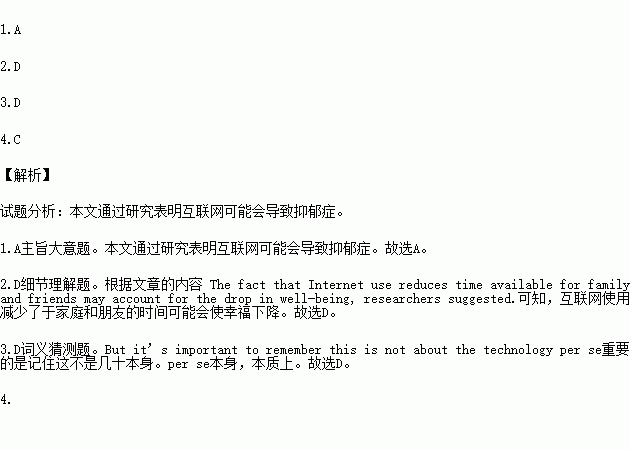题目内容
Internet use appears to cause a decline in psychological well-being(安康), according to research at Carnegie Mellon University.
Even people who spent just a few hours a week on the Internet experienced more depression and loneliness than those who logged on less frequently, the two-year study showed. And it wasn’t that people who were already feeling bad spent more time on the Internet, but that using the Net actually appeared to cause the bad feeling.
Researchers are puzzling over the results, which were completely contrary to their expectations. They expected that the net would prove socially healthier than television, since the Net allows users to choose their information and to communicate with others.
The fact that Internet use reduces time available for family and friends may account for the drop in well-being, researchers suggested. Faceless, bodiless “virtual”(虚拟的)communication may be less psychologically satisfying than actual conversation, and the relationship formed through it may be shallower. Another possibility is that exposure to the wider world via the Net makes users less satisfied with their lives.
“But it’s important to remember this is not about the technology per se; it’s about how it is used,” says psychologist Christine Riley of Intel, one of the study’s sponsors. “It really points to the need for considering social effects in terms of how you design applications and services for technology.”
1.The best title for this passage would be ________.
A. Internet may Cause Depression
B. The Dark Side of Internet
C. How to Use Technology Properly
D. The Importance of Psychological Well-being
2.Internet use may cause a decline in psychological well-being because ________.
A. people who were already feeling bad spend more time on the Internet
B. Internet users thought the world was wider than it really was
C. people were too eager to turn the “virtual” communication into reality
D. people have less time for actual communication with their family and friends
3.What does the underlined Latin word “per se” (in Para. 5) mean?
A. probably | B. absolutely |
C. oneself | D. itself |
4.What’s the tone of the passage?
A. Optimistic. | B. Critical. |
C. Objective. | D. Pessimistic. |

